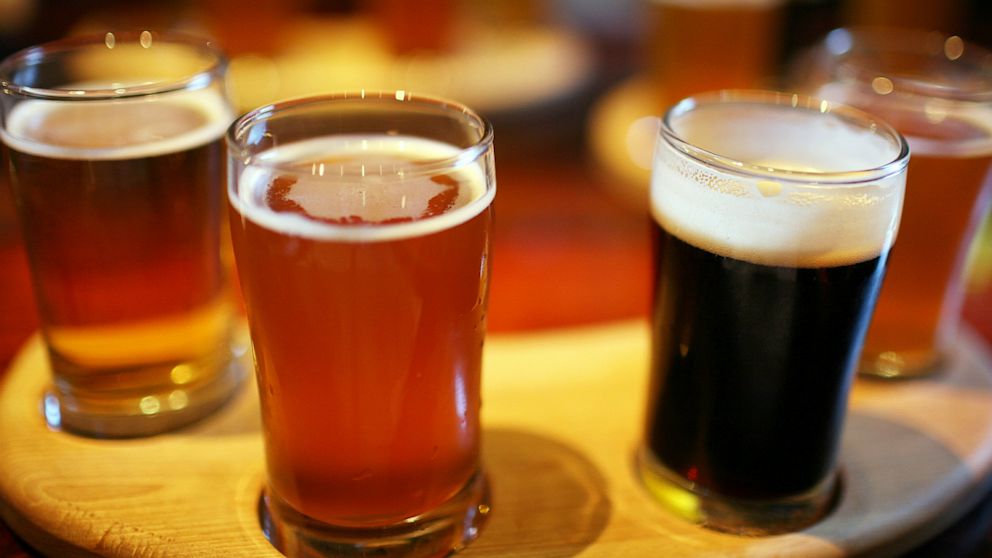Trading Buds for Micro-Brewskis: Craft Beer's Renaissance Continues to Grow
More people are bypassing domestic beers for higher-quality craft brews.

Aug. 30, 2013— -- Beer is having a big moment, a revolution of sorts. When it comes to grabbing a cold one, more people seem to be bypassing the big dogs and seeking out better-tasting craft brews.
"I think that the brewers are driving each other, and I think the drinkers are driving the brewers," said Joe Emswiler, who reviews hundreds of craft beers on his website, properhops.com. "Pretty much anything you want to brew right now, the sky's the limit. People are going to want to try it."
Watch ABC News' Nutrition and Wellness Editor David Zinczenko's full report on "Nightline" Friday, Sept. 6
American craft brew sales are up 15 percent over last year's, according to the Brewers Association's mid-year report, which was released in July. The organization represents more than 1,400 small and independent U.S. breweries, or around 70 percent of the brewing industry.
Brooklyn Brewery, a small craft brewery based in New York, is producing only a tiny fraction of beer compared to the big guys, but says business is booming. Brewmaster Garrett Oliver said the microbrewery is making 10 times more beer than it was three years ago.
"This movement is happening now because our entire culture is moving toward more flavor," Oliver said. "I don't want to sit on the couch and drink something that has no flavor to it. It is like it is no fun. It is better to have two beers that taste great then to have six beers that don't taste like anything, and I think people have finally come to realize that."
Today, craft beer is taken as seriously as fine wine. Jim Koch, a sixth-generation brewmaster and the founder of the Boston Beer Co., knows that better than anyone. The Boston Beer Co. is the home of Samuel Adams, the largest craft beer maker in the country.
"Beer can give you everything that you can get in a great wine or a great Scotch or a great bourbon," Koch said. "Beer deserves to be considered at that level, and that's what craft brewers are doing. We are bringing respect to beer."
There is a lot at stake because beer is obviously big business -- a $100 billion industry across the board, with more than 6 trillion gallons sold each year.
In the past, big dogs like Anheuser-Busch InBev and MillerCoors were calling the shots, spending millions on Super Bowl ads and other campaigns to keep their brands on top.
But over the past few years, craft breweries have exploded in the United States. There are currently 2,538 breweries in operation -- with 446 new breweries launching in the past year alone. From January to June this year, small craft breweries sold 7.3 million barrels.
Koch started brewing in his kitchen 30 years ago. Now he ships 2.5 million barrels a year.
What sets craft beer apart, he says, is the quality of the four main ingredients: water, malt, yeast and hops.
"I still go to Bavaria, [Germany], every year and hand-select every single batch of hops that goes into Boston Lager," Koch said.
But the big beer companies stand by their staples.
"We have the first selection of ingredients from the best growers in the world," said Peter Kremer, the vice president of brewing for Anheuser-Busch.
"There's a reason why we sell as much Bud and Bud light that we do. It's because people like it and it's good," added Paul Chibe, the company's U.S. chief marketing officer. "A Budweiser has to sit in the tank 30 days to get the smooth flavor that it has."
And often those craft brews come at a price -- they tend to cost a few dollars more per pint than their domestic counterparts.
But as the craft brewing business keeps growing exponentially, big beer companies are scrambling to get a cut of the craze.
Belgian-owned Anheuser-Busch has long been a Goliath in the world of beer. With help from their brands such as Budweiser, the self-proclaimed "King of Beers," the company owns 47 percent of the American market.
Anheuser-Busch said it was not only embracing the craft beer renaissance but helping it.



